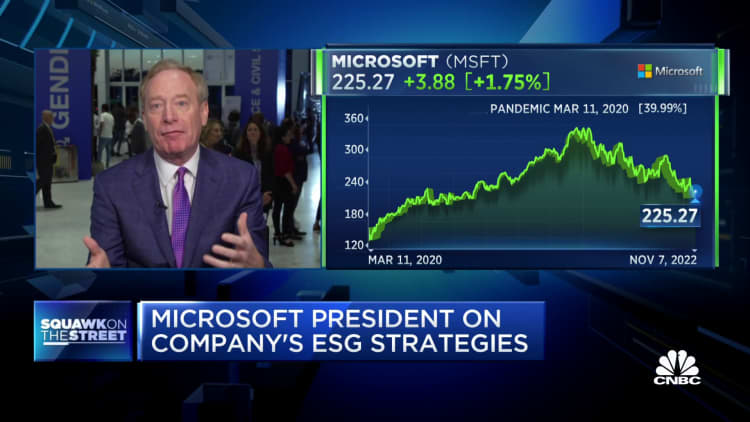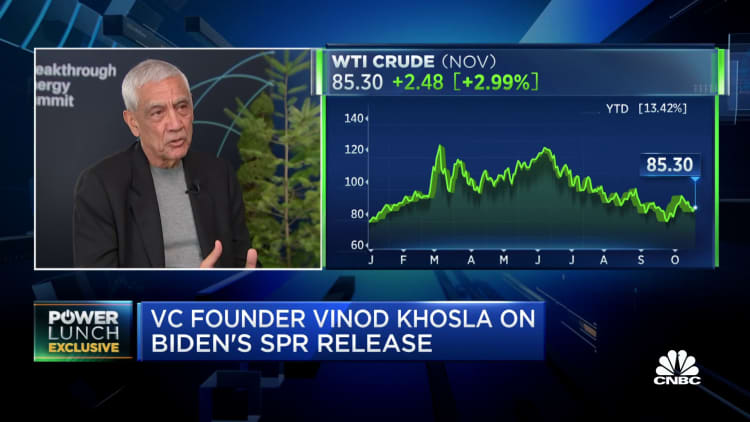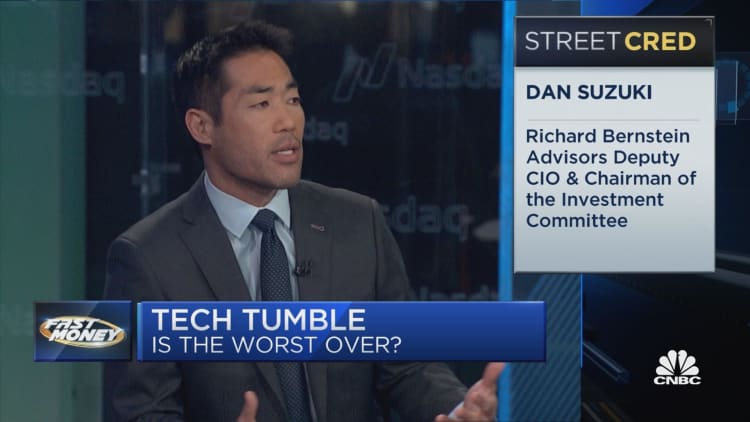Tech’s reality check: How the industry lost $7.4 trillion in one year
Pedestrians walk past the NASDAQ MarketSite in New York’s Times Square.
Eric Thayer | Reuters
It seems like an eternity ago, but it’s just been a year.
At this time in 2021, the Nasdaq Composite had just peaked, doubling since the early days of the pandemic. Rivian’s blockbuster IPO was the latest in a record year for new issues. Hiring was booming and tech employees were frolicking in the high value of their stock options.
Twelve months later, the landscape is markedly different.
Not one of the 15 most valuable U.S. tech companies has generated positive returns in 2021. Microsoft has shed roughly $700 billion in market cap. Meta’s market cap has contracted by over 70% from its highs, wiping out over $600 billion in value this year.
In total, investors have lost roughly $7.4 trillion, based on the 12-month drop in the Nasdaq.
Interest rate hikes have choked off access to easy capital, and soaring inflation has made all those companies promising future profit a lot less valuable today. Cloud stocks have cratered alongside crypto.
There’s plenty of pain to go around. Companies across the industry are cutting costs, freezing new hires, and laying off staff. Employees who joined those hyped pre-IPO companies and took much of their compensation in the form of stock options are now deep underwater and can only hope for a future rebound.
IPOs this year slowed to a trickle after banner years in 2020 and 2021, when companies pushed through the pandemic and took advantage of an emerging world of remote work and play and an economy flush with government-backed funds. Private market darlings that raised billions in public offerings, swelling the coffers of investment banks and venture firms, saw their valuations marked down. And then down some more.
Rivian has fallen more than 80% from its peak after reaching a stratospheric market cap of over $150 billion. The Renaissance IPO ETF, a basket of newly listed U.S. companies, is down 57% over the past year.
Tech executives by the handful have come forward to admit that they were wrong.
The Covid-19 bump didn’t, in fact, change forever how we work, play, shop and learn. Hiring and investing as if we’d forever be convening happy hours on video, working out in our living room and avoiding airplanes, malls and indoor dining was — as it turns out — a bad bet.
Add it up and, for the first time in nearly two decades, the Nasdaq is on the cusp of losing to the S&P 500 in consecutive years. The last time it happened the tech-heavy Nasdaq was at the tail end of an extended stretch of underperformance that began with the bursting of the dot-com bubble. Between 2000 and 2006, the Nasdaq only beat the S&P 500 once.
Is technology headed for the same reality check today? It would be foolish to count out Silicon Valley or the many attempted replicas that have popped up across the globe in recent years. But are there reasons to question the magnitude of the industry’s misfire?
Perhaps that depends on how much you trust Mark Zuckerberg.
Meta’s no good, very bad, year
It was supposed to be the year of Meta. Prior to changing its name in late 2021, Facebook had consistently delivered investors sterling returns, beating estimates and growing profitably with historic speed.
The company had already successfully pivoted once, establishing a dominant presence on mobile platforms and refocusing the user experience away from the desktop. Even against the backdrop of a reopening world and damaging whistleblower allegations about user privacy, the stock gained over 20% last year.
But Zuckerberg doesn’t see the future the way his investors do. His commitment to spend billions of dollars a year on the metaverse has perplexed Wall Street, which just wants the company to get its footing back with online ads.

The big and immediate problem is Apple, which updated its privacy policy in iOS in a way that makes it harder for Facebook and others to target users with ads.
With its stock down by two-thirds and the company on the verge of a third straight quarter of declining revenue, Meta said earlier this month it’s laying off 13% of its workforce, or 11,000 employees, its first large-scale reduction ever.
“I got this wrong, and I take responsibility for that,” Zuckerberg said.
Mammoth spending on staff is nothing new for Silicon Valley, and Zuckerberg was in good company on that front.
Software engineers had long been able to count on outsized compensation packages from major players, led by Google. In the war for talent and the free flow of capital, tech pay reached new heights.
Recruiters at Amazon could throw more than $700,000 at a qualified engineer or project manager. At gaming company Roblox, a top-level engineer could make $1.2 million, according to Levels.fyi. Productivity software firm Asana, which held its stock market debut in 2020, has never turned a profit but offered engineers starting salaries of up to $198,000, according to H1-B visa data.
Fast forward to the last quarter of 2022, and those halcyon days are a distant memory.
Layoffs at Cisco, Meta, Amazon and Twitter have totaled nearly 29,000 workers, according to data collected by the website Layoffs.fyi. Across the tech industry, the cuts add up to over 130,000 workers. HP announced this week it’s eliminating 4,000 to 6,000 jobs over the next three years.
For many investors, it was just a matter of time.
“It is a poorly kept secret in Silicon Valley that companies ranging from Google to Meta to Twitter to Uber could achieve similar levels of revenue with far fewer people,” Brad Gerstner, a tech investor at Altimeter Capital, wrote last month.
Gerstner’s letter was specifically targeted at Zuckerberg, urging him to slash spending, but he was perfectly willing to apply the criticism more broadly.
“I would take it a step further and argue that these incredible companies would run even better and more efficiently without the layers and lethargy that comes with this extreme rate of employee expansion,” Gerstner wrote.

Activist investor TCI Fund Management echoed that sentiment in a letter to Google CEO Sundar Pichai, whose company just recorded its slowest growth rate for any quarter since 2013, other than one period during the pandemic.
“Our conversations with former executives suggest that the business could be operated more effectively with significantly fewer employees,” the letter read. As CNBC reported this week, Google employees are growing worried that layoffs could be coming.
SPAC frenzy
Remember SPACs?
Those special purpose acquisition companies, or blank-check entities, created so they could go find tech startups to buy and turn public were a phenomenon of 2020 and 2021. Investment banks were eager to underwrite them, and investors jumped in with new pools of capital.
SPACs allowed companies that didn’t quite have the profile to satisfy traditional IPO investors to backdoor their way onto the public market. In the U.S. last year, 619 SPACs went public, compared with 496 traditional IPOs.
This year, that market has been a bloodbath.
The CNBC Post SPAC Index, which tracks the performance of SPAC stocks after debut, is down over 70% since inception and by about two-thirds in the past year. Many SPACs never found a target and gave the money back to investors. Chamath Palihapitiya, once dubbed the SPAC king, shut down two deals last month after failing to find suitable merger targets and returned $1.6 billion to investors.
Then there’s the startup world, which for over a half-decade was known for minting unicorns.
Last year, investors plowed $325 billion into venture-backed companies, according to EY’s venture capital team, peaking in the fourth quarter of 2021. The easy money is long gone. Now companies are much more defensive than offensive in their financings, raising capital because they need it and often not on favorable terms.

“You just don’t know what it’s going to be like going forward,” EY venture capital leader Jeff Grabow told CNBC. “VCs are rationalizing their portfolio and supporting those that still clear the hurdle.”
The word profit gets thrown around a lot more these days than in recent years. That’s because companies can’t count on venture investors to subsidize their growth and public markets are no longer paying up for high-growth, high-burn names. The forward revenue multiple for top cloud companies is now just over 10, down from a peak of 40, 50 or even higher for some companies at the height in 2021.
The trickle down has made it impossible for many companies to go public without a massive markdown to their private valuation. A slowing IPO market informs how earlier-stage investors behave, said David Golden, managing partner at Revolution Ventures in San Francisco.
“When the IPO market becomes more constricted, that circumscribes one’s ability to find liquidity through the public market,” said Golden, who previously ran telecom, media and tech banking at JPMorgan. “Most early-stage investors aren’t counting on an IPO exit. The odds against it are so high, particularly compared against an M&A exit.”
There have been just 173 IPOs in the U.S. this year, compared with 961 at the same point in 2021. In the VC world, there haven’t been any deals of note.
“We’re reverting to the mean,” Golden said.
An average year might see 100 to 200 U.S. IPOs, according to FactSet research. Data compiled by Jay Ritter, an IPO expert and finance professor at the University of Florida, shows there were 123 tech IPOs last year, compared with an average of 38 a year between 2010 and 2020.
Buy now, pay never
There’s no better example of the intersection between venture capital and consumer spending than the industry known as buy now, pay later.
Companies such as Affirm, Afterpay (acquired by Block, formerly Square) and Sweden’s Klarna took advantage of low interest rates and pandemic-fueled discretionary incomes to put high-end purchases, such as Peloton exercise bikes, within reach of nearly every consumer.
Affirm went public in January 2021 and peaked at over $168 some 10 months later. Affirm grew rapidly in the early days of the Covid-19 pandemic, as brands and retailers raced to make it easier for consumers to buy online.
By November of last year, buy now, pay later was everywhere, from Amazon to Urban Outfitters‘ Anthropologie. Customers had excess savings in the trillions. Default rates remained low — Affirm was recording a net charge-off rate of around 5%.
Affirm has fallen 92% from its high. Charge-offs peaked over the summer at nearly 12%. Inflation paired with higher interest rates muted formerly buoyant consumers. Klarna, which is privately held, saw its valuation slashed by 85% in a July financing round, from $45.6 billion to $6.7 billion.
The road ahead
That’s all before we get to Elon Musk.
The world’s richest person — even after an almost 50% slide in the value of Tesla — is now the owner of Twitter following an on-again, off-again, on-again drama that lasted six months and was about to land in court.
Musk swiftly fired half of Twitter’s workforce and then welcomed former President Donald Trump back onto the platform after running an informal poll. Many advertisers have fled.
And corporate governance is back on the docket after this month’s sudden collapse of cryptocurrency exchange FTX, which managed to grow to a $32 billion valuation with no board of directors or finance chief. Top-shelf firms such as Sequoia, BlackRock and Tiger Global saw their investments wiped out overnight.
“We are in the business of taking risk,” Sequoia wrote in a letter to limited partners, informing them that the firm was marking its FTX investment of over $210 million down to zero. “Some investments will surprise to the upside, and some will surprise to the downside.”
Even with the crypto meltdown, mounting layoffs and the overall market turmoil, it’s not all doom and gloom a year after the market peak.
Golden points to optimism out of Washington, D.C., where President Joe Biden’s Inflation Reduction Act and the Chips and Science Act will lead to investments in key areas in tech in the coming year.
Funds from those bills start flowing in January. Intel, Micron and Taiwan Semiconductor Manufacturing Company have already announced expansions in the U.S. Additionally, Golden anticipates growth in health care, clean water and energy, and broadband in 2023.
“All of us are a little optimistic about that,” Golden said, “despite the macro headwinds.”
WATCH: There’s more pain ahead for tech

For all the latest Technology News Click Here
For the latest news and updates, follow us on Google News.

